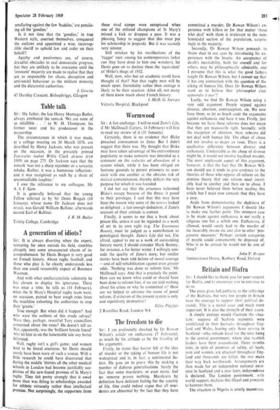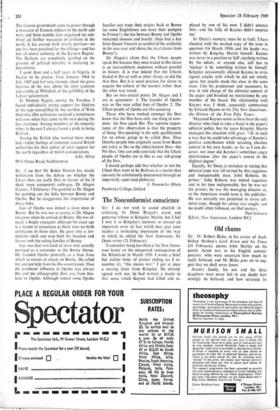Britain and Biafra
Sir: I should like to thank you for your support for Biafra, and to encourage you to continue to do so.
The press gives full publicity to the sufferings of the Biafrans, but very few people in Britain have the courage to support their political de- mands. This is a moral issue and much more important. It is also the strength of their cause.
A simple analogy would illustrate the situa- tion: suppose all Scottish regiments were annihilated in their barracks throughout Eng- land and Wales, leaving only those serving in Scotland—who remain loyal for the time being to the central government, where also Scottish leaders have been assassinated. Three months later, in spite of promises of safety, all Scots, men and women, are attacked throughout Eng- land and thousands are killed, the rest make their way back northwards. Arrangements are then made for an independent national exist- ence in Scotland and a year later, independence is declared. The London government, with world support, declares this illegal and proceeds to hammer them.
The situation in Nigeria is utterly monstrous. The Gowon government came to power through a massacre of Eastern soldiers in the north and west, and three months later organised (or con- nived at) further massacres of civilians in the north. It has proved itself utterly partisan—no one has been punished for the killings—and has lost all moral authority in the Eastern Region. The Biafrans are completely justified on the grounds of political morality in declaring in- dependence.
I spent three and a half years in Nigeria, in Ibadan to be precise, from January 1964 to July 1967 and feel very strongly about the gross injustice of the war, about the utter cynicism and cruelty of Whitehall, of the gullibility of the Labour government.
In Western Nigeria among the Yorubas, I found individually strong support for Ojukwu of the type exemplified by the sacrifice of Wole Shoyinka (Ibo politicians received a tumultuous welcome when they came to the west during the last elections). Among members of the minority tribes in the east I always found a pride in being Biaf ran.
Among the British who worked there, many had violent feelings of contempt toward British authorities for their policy of total support for the north regardless of moral considerations. John Milne 90 St Denys Road, Southampton



































 Previous page
Previous page